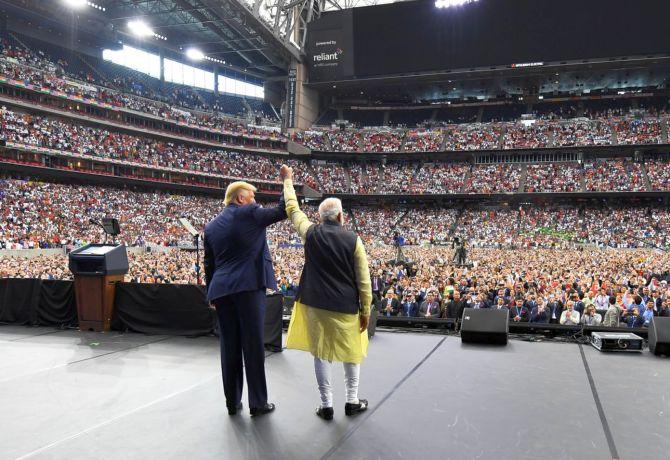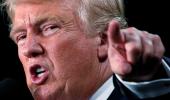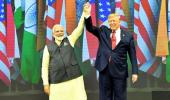The US seems to be engaging in a game of brinkmanship where President Trump's visit has been used as 'leverage' to pressure India into agreeing to a trade deal, notes Kashish Parpiani.

On Monday, US President Donald J Trump will make his maiden visit to India.
The visit comes amidst trade frictions nearing a crescendo and negotiations concurrently stalling on multiple occasions under the Trump era.
Over the past three years, trade tensions between India and the US have escalated.
Interestingly, even as the US's trade deficit with India has begun to narrow (external link) and stands at less than a tenth (external link) of the US's trade deficit with China, tensions have escalated -- signifying American apprehensions to have stemmed from factors beyond trade imbalances (external link).
As a result, the Trump administration levied steel and aluminium tariffs on India, revoked India's status under the Generalised System of Preferences (GSP) programme, momentarily contemplated limiting Indians's H1-B visas quota to 15 percent due to differences over e-commerce regulations, and raised the prospect of a Section 301 investigation into India's tariff/non-tariff trade barriers.
On a limited trade deal that is expected to be signed during the visit, reports have been mixed -- with some suggesting that officials are 'considering taking even a modest trade deal off the table'.
The impending trade package reportedly could include gains for the US worth nearly $10 billion, with greater market access for agricultural and dairy products.
This would be in addition to India also finalising a defence package worth $3.5 billion for 24 multi-role MH-60R Seahawk maritime helicopters and 6 AH-64E Apache attack helicopters.
However, talks have reportedly reached a stalemate as both sides have alleged the either party of 'changing goalposts'.
For instance, with the limited trade deal, India's expectation has been to have its GSP benefits reinstated -- under which Indian exports worth $5.7 billion to the US enjoyed duty-free status in 2017.
However, regardless of the deal materialising, it seems the US has already foreclosed the possibility of India having its GSP benefits reinstated.
Within days of the Trump administration announcing the dates of President Trump's visit to India, the United States trade representative released a federal notice on announcing the removal of a group of countries from its methodology for countervailing duty investigations.
As a result, India was removed from the list of developing countries that 'are exempt from investigations into whether they harm American industry with unfairly subsidised exports'.
With this move, the US essentially has now classified India as a developed country.
This effectively renders India to no longer be eligible for benefits under the GSP, which is an American preferential arrangement solely for developing countries.
Without GSP, the Indian economy is expected bear a direct and indirect cost of nearly $260 million.
With this development -- possibly reflective of Trump's 'Art of the Deal' of gaining competitive leverage by pursuing zero-sum negotiations, the American president's visit may be reduced to mere pomp and galore.
Beyond the possibility of the two sides inking a limited trade deal, Trump has expressed his exhilaration over 'millions and millions of people' that are expected to attend the 'Namaste, Trump' event in Ahmedabad.
However, with public appearances like the 'Namaste, Trump' event in Ahmedabad, much like the 'Howdy, Modi!' rally in Houston last year, Trump's political arithmetic on the Indian-American voter is writ large.
In case of the latter, there was a singular-attempt to court the 270,000-strong Indian-American community (external link) in the emerging battleground state of Texas.
With the event in Gujarat, reports underscore Trump's attempt to consolidate the votes of the Gujarati Diaspora in the United States which already tends to lean towards Trump's pro-business policies like eliminating regulations.
Moreover, by visiting Prime Minister Narendra Damnodardas Modi's home turf, Trump would also attempt to court the three million-strong Indian-American community (external link) at-large via underscoring his proximity to Modi's India.
With the possible limited trade deal as well, Trump's 2020 re-election campaign stands to gain.
The US senate acquitted Trump over the impeachment proceedings into his alleged quid pro quo over offering Ukraine military aid in exchange for political dirt against former US vice-president and now Democratic presidential candidate Joe Biden.
Given the partisan nature of the impeachment proceedings, Democrats are expected to continue to underscore the Ukraine affair during the 2020 US presidential elections.
By that extension, Trump's values-bereft, transactional, conduct at-large on the world stage will also accrue considerable attention.
In response, the Trump campaign would possibly double-down by highlighting the supposed efficacy of the 'America First' worldview.
Thus, the US-India limited trade deal would be listed amongst other renewed partial/complete trade deals -- such as the USMCA deal with Canada and Mexico; renegotiated trade terms with South Korea and Japan; and finally the Phase One deal with China, as instances of vindication.
Days before the Democrats's Iowa caucus, Trump addressed a rally in Des Moines, Iowa.
Referencing his renegotiated trade deals and the Democrats's opposition to his administration exacting renewed deals, Trump sought to galvanise American farmers that make up for a considerable share of his vote base even though some are adversely affected by Trump's trade wars.
Similarly, with the US-India deal, reports suggest American negotiators have been pushing for India to lower tariffs on pecan nuts.
The same also holds relevance from the 2020 elections standpoint.
The pecan industry contributes more than $3.5 billion to the 15 pecan-producing states, including Georgia, Alabama, Arkansas, Texas and Mississippi -- many of them being the 'flyover states' which were instrumental in Trump's victory in 2016 and would surely be so once again in 2020.
Given these apparent political considerations behind Trump's visit to India -- and the intent to explore a limited trade deal, it would be prudent for India to steer clear of according Trump a political endorsement ahead of the 2020 elections.
The 'Howdy, Modi!' event's partisan fervour in favor of Trump may have only accentuated the recent rise in the Democrats's apprehensions on India's prolonged communications lockdown in Kashmir.
Thus, amidst rising partisanship in American politics, the 'Namaste, Trump' event too must refrain from being a celebration of the incumbent US president.
A welcomed step in this regard was the recent decision to rename the event in Ahmedabad from 'Kem Chho Trump' to 'Namaste, Trump' in order to give it a pan-India appeal, rather than reflecting Trump's need to court Gujaratis.
Similarly, on the trade deal, India must pursue a politically neutral trade package -- bereft of latent asks -- on pecan nuts, for instance.
Recent reports suggest, the US to be testing India's anxiety level -- how desperately does New Delhi want the deal? Essentially, in raising the spectre of not finalising the deal ahead of Trump's visit, the US seems to be engaging in a game of brinkmanship, where President Trump's visit has been used as 'leverage' to pressure the other side into agreeing to a deal in time.
Therefore, in insisting the purview of the suggested limited deal to remain as it were, India must be prepared to call the 'deal-maker' American president's bluff.
Kashish Parpiani is a Research Fellow, Observer Research Foundation.










